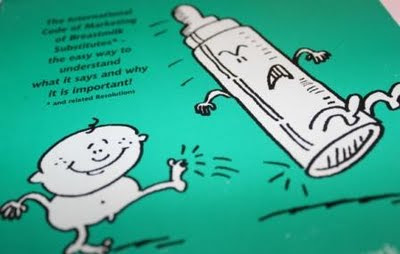Excited, I quietly began opening each drawer of the bassinet to peek at all the free goodies. The first drawer held baby blankets, head caps, diapers, and a diaper bag. YAY! The second drawer had bottles of baby body wash, shampoo, and soft towels to bathe him with. YAY, YAY! When I got to the third drawer, I almost couldn't get it open. When I finally did, my excitement quickly turned to disappointment as I realized the drawer was packed full to the rim with tins of formula.
Didn't she read my birth plan?! It very clearly stated that I planned to exclusively breastfed my babe and at no point did I want breastmilk substitutes being offered to us. How could she have missed it? It was highlighted in RED!
The next time the nurse came in to refill the drawers, I told her not to bother adding more formula bottles because I was a breastfeeding mom. I even asked her to remove the ones that were already there. She politely refused and said the contents were standard for all hospital bassinets. Confused as to why formula bottles would be standard, I just said "okay" and spent the rest of my stay pretending that the third drawer didn't exist.
What I know now, is that hospital practices like these, and others, are done because formula companies spend BIG BUCKS to have health care workers help them market their products. According to the International Baby Food Action Network, the sale of artificial baby milk is a $13 BILLION a year industry. And what better way to market a product for new moms and babies than through their own doctor's hands? The saddest part of all this is that these practices actually contribute to greater risk of infant disease and death around the world and are in blatant violation of the International Code of Marketing of Breastmilk Substitutes.
What is The International Code of Marketing of Breastmilk Substitutes?
The code is a global health effort to protect breastfeeding that was adopted in 1981 by The World Health Assembly and UNICEF. It does not ban infant formula or baby foods, or punish those who bottle feed. It simply regulates the marketing practices of breastmilk substitutes so that mothers are provided with true, accurate information on the dangers of breastmilk substitutes to their and their children's health.
What Does the Code Include?
The code applies to all breastmilk substitutes given before six months of age, including:
- infant formula
- follow-up milks
- other milk products
- baby juices and teas
- cereals and vegetable mixes
- feeding bottles and teats (pacifiers and other false nipples)
Summary of the Main Points of the Code
1. NO advertising of breastmilk substitutes and other products to the public
2. NO free samples of breastmilk substitutes to mothers.
3. NO promotion of breastmilk substitutes in health services.
4. NO breastmilk substitutes company personnel are allowed to advise mothers on infant feeding.
5. NO gifts of personal samples of breastmilk substitutes are to be given to health workers.
6. NO pictures of infants, or other images idealizing artificial feeding on labels or products.
7. Information on artificial feeding provided to health workers must be scientific and factual.
8. Information on artificial feeding, including on product labels, should explain the benefits of breastfeeding as well as the dangers of artificial feeding.
9. Unsuitable products, such as sweetened condensed milk, should not be promoted for babies.
How Can I Tell if My Hospital is "Baby-Friendly"?
There is no doubt that breastfeeding gives babies the best start. Unfortunately many hospitals and clinics today do not support breastfeeding or moms wanting to breastfeed. In 1992, the World Health Organization launched the Baby Friendly Initiative to reverse this trend. The initiative contains 10 steps that health facilities must take in order to be considered supportive and protective of breastfeeding practices.
Step 1: Have a written breastfeeding policy that is routinely communicated to all health care staff.
Step 2: Train all health care staff in skills necessary to implement this policy.
Step 3: Inform all pregnant women about the benefits and management of breastfeeding.
Step 4: Help mothers initiate breastfeeding within a half-hour after birth.
Step 5: Show mothers how to breastfeed and how to maintain lactation even if they should be separated from their infants.
Step 6: Give newborn infants no food or drink other than breastmilk, unless medically necessary.
Step 7: Practice rooming-in. Allow mothers and infants to remain together 24 hours a day.
Step 8: Encourage breastfeeding on demand.
Step 9: Give no artificial teats or pacifiers (also called dummies or soothers) to breastfeeding infants.
Step 10: Foster the establishment of breastfeeding support groups and refer mothers to them upon discharge from the hospital or clinic.


Salam Aleikum,
ReplyDeleteJazakALlahkhair for the article. I am reading the 'The International Code of Marketing of Breastmilk 1981 now. SuphanAllah how we have to fight to not have our children fed 'breastmilk substitutes'. I remember when I gave birth to my son, having to argue with the nurses numerous times to not let my son have a pacifier or bottle. It is so routine to formula feed infants, that breastfeeding moms feel like they are the odd ones. <3
Wa Iyaki sis. InshaAllah as education and awareness about breastfeeding increases, healthcare providers will realize that breastfeeding is the norm. Breastfeeding moms should be supported and protected, not alienated or belittled.
ReplyDelete